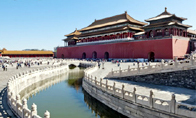29
On the afternoon of November 29, Foreign Ministry Spokesman Liu Jianchao held a regular press conference.
Liu: Good afternoon, ladies and gentlemen! I would like to begin with an announcement:
At the invitation of the Chinese Government, the United Nations Secretary General Kofi Annan will pay an official visit to China from December 4th to 7th. This is Secretary General Annan's seventh visit to China since his assumption of office. The two sides will exchange ideas on the international and regional issue of common interest and the cooperation between China and the UN.
In addition, one notice for you. On November 30, that is, 10 o'clock tomorrow morning, we will hold a briefing right in this room. We will invite Director-General Cui Tiankai of the Department of Asian Affairs of MFA and Director-General Zhao Jun of the Department of European Affairs to give a briefing on Premier Wen Jiabao's visit to five European and Asian countries and his attendance at the ASEAN plus China, Japan and ROK Summit. They will take up questions from the press. You are welcome to join us.
Now, the floor is open.
Q: It is reported that Malaysian Minister of Home Affairs scheduled to visit China tomorrow. Now, his visit has been postponed to December 20. Please confirm. If China requested the postponement, why did China do so? Recently, several incidents of insulting Chinese women occurred successively in Malaysia. What impact will these incidents have on China's relations with Malaysia?
A: Regarding the visit of Malaysian Minister of Home Affairs, as far as I know, China and Malaysia have been staying in consultation on this matter, including the schedule of his visit. When this visit would start will be up to the convenience of both sides. We welcome the visit of Malaysian Home Affairs Minister, when we shall exchange views on bilateral cooperation and other relevant questions.
On your second question, what I wish to emphasize is that the Chinese Government has consistently attached importance to the protection of legitimate rights and interests of Chinese citizens. The Foreign Ministry and Chinese embassy in Malaysia have expressed their concern over the incident of insulting Chinese citizens and made solemn representations to the Malaysian side on many occasions, requiring them to start investigation immediately and seriously punish the perpetrators. We have taken note that Malaysian senior officials have apologized for the incidents and ordered investigation. China will continue to urge Malaysia to take effective measures to on the one hand, find out truth and punish perpetrators and on the other hand, ensure the dignity and personal safety of the Chinese citizens in Malaysia, so as to prevent the recurrence of similar incidents.
Q: Please brief on the latest development of the visit of UN special rapporteur on torture.
A: UN Special Rapporteur on Torture Nowak is still visiting China and will stay until December 2. Now, he has held meetings and talks with the officials from Chinese Foreign Ministry, Ministry of Justice, Ministry of Public Security and Supreme People's Procuratorate. He has also visited some facilities of detention and held discussions with non-governmental organizations, lawyers and scholars. What I have learned so far shows that the visit is proceeding smoothly. According to the plan, Mr. Nowak will travel to Tibet and Xinjiang. We hope the exchange will enhance the mutual understanding between the two sides.
Q: Will the incident of insulting female Chinese citizens affect China-Malaysia relations?
A: The incident deserves high attention by the Malaysian side. China and Malaysia have dynamic exchanges in various fields and share extensive cooperation in trade, economy, education, culture, tourism and personnel exchange. It is essential to ensure a good living and safety environment for each others' citizens within our own territory, in order to further expand our exchange and cooperation and build people's confidence in having exchanges. We hope and believe the Malaysian side will treat the incident with all seriousness and take effective measures to find out truth, bring perpetrators to justice and improve the environment for the work, life and study of Chinese citizens in Malaysia.
Q: Some critics believe that the pollution of Songhua River and SARS strike have revealed China's lack of transparency and unreadiness to shoulder the responsibility of globalism. What's your response to that? Will China seek international assistances and cooperation to cope with the pollution of Songhua River? Will the incident affect China-Russia relations?
A: The globalization reflects not only in economy. The environment issue is also an important question for globalization. China and Russia share cross-border rivers. Each and every measure China takes at the up reach within our territory will give full consideration to the concern and interest of the down reach country. Since a severe pollution was caused at Songhua River by the explosion of Jinlin PetroChemical Company, we have been closely following the pollution. Since November 22, China has begun to inform Russia of the development. Up to this stage, the principal officials of Chinese Ministry of Water Resources, State Environment Protection Administration and Foreign Ministry have communicated the situation to the Russian side in person. China has informed Russia of the monitoring data of river pollution at fixed hour and on daily basis since the 24th. China has also taken measures to mitigate the pollution. We believe that through effective cooperation between China and Russia, we can diminish the possible harm of pollution to minimum level. China will do whatever we can to ensure the safety of Chinese and Russian people. Last night, Deputy Director of SEPA Zhang Lijun went to Harbin from Beijing, to meet with the delegation headed by the director of the Bureau of Environment Protection for Khabarovsk of Russian Ministry of Natural Resources. He made a thorough briefing to the Russian side on the monitoring result on the Chinese part and sent Russia a set of monitoring equipment for fast detection of benzene-based pollutants. We believe such cooperation will be carried on.
Regarding the question of China's cooperation with the international community, we believe that SEPA takes a welcoming and open attitude towards cooperation with relevant international organization.
On your third question, it is the common wish of China and Russia to steadily deepen China-Russia strategic partnership of cooperation. Neither of the two governments wishes to see the incident damage China-Russia relations. The two sides will continue to strengthen cooperation and make efforts to reduce the possible harm of pollution as much as possible.

Q: The first conference of the signatory parities to Kyoto Protocol was convened in Montreal, Canada. What position does China take on the Kyoto Protocol? What proposition will China forward at the conference?
A: The conference is the first meeting of signatory parties since the Protocol took effect. China has taken a positive attitude towards the Kyoto Protocol and joined the protocol. We believe that the protocol has played an important role in ensuring the sustainable development of the world and the effective protection of environment. We are ready to step up cooperation with other countries in this field and meanwhile, call on the countries that have not signed or approved the Kyoto Protocol to approve as soon as possible.
Q: Last weekend, Chinese Foreign Minister Li Zhaoxing expressed to the Russian Ambassador to China an apology on the potential harm that the pollution of the Songhua River might bring to the downstream Russian people. Does China prepare to provide compensation to Russia? Did Russia make such demand?
A: As far as I know, the two sides did not touch upon that issue.
Q: China and Japan have previously scheduled to hold a consultation over the East China Sea in October, but have not held the consultations yet. Do you expect that this consultation would be held in near future?
A: We have long held that China and Japan should solve their differences over the East China Sea issue through consultation. As to when the next round of consultation over the East China Sea will be held, I do not have any information at hand right now.
Q: The Mongolian President is visiting China right now. Could you summarize the fruits of his visit? What are the most outstanding issues in the bilateral relations?
A: Yesterday, President Hu Jintao held substantial and fruitful talks with the Mongolian President Enkhbayar and Premier Wen Jiabao also met with him. Both sides positively appraised the Sino-Mongolian Good-neighborly and Friendly Partnership, and elaborated the suggestions and propositions on further developing Sino-Mongolian relations. China has already released relevant information on the Foreign Ministry's website, which is rich in substance. I suggest that you check it up on the website. In a word, we think good achievements have been made in yesterday's talks and meetings, and the two sides were determined to further develop the friendly and mutually beneficial cooperation in various fields of politics, economy, trade and culture. At present, President Enkhbayar is still visiting China and he will go on to tour Tianjin, Hangzhou and Shanghai. We hope that his visit will be a successful one.
Q: It is learned that Japan and China will hold a consultation next month in Beijing on the UN reform. What suggestion is China going to make on the issue of the UN reform? What is China's position on that issue? Which Chinese leaders will Secretary General Annan meet during his visit to China?
A:, I do not have any information at hand on your first question now, and I can help you to acquire relevant information. As to China's position on the reform of the UN Security Council, China supports the reform of the UN Security Council, and holds that priority should be given to the increase of the representation of developing countries, African countries in particular, so that more medium-sized and small countries could have more opportunities to participate in the decision making process of the UN Security Council. The reform of the UN Security Council should proceed in accordance with the principle of democratization of the international relations, so that a method acceptable to all parties could be sought on the basis of broad consultation.
I believe during Secretary General Annan's visit to China, the two sides will exchange ideas on issues relating to the UN reforms. Chinese leaders and officials in the Foreign Ministry will hold talks and meet with him. Details of his visit are still under discussion.
Q: The US Department of Treasury has released a report saying that China was not manipulating the RMB exchange rates. What comments do you have?
A: China has never exercised any policy of manipulating the RMB exchange rates. We formulate our foreign exchange rate policy and promote foreign exchange rate reform according to China's actual situation and in accordance with the principle of benefiting the international community and China itself.
If there are no more questions awaiting, this is the end of the press conference. Thank you.




